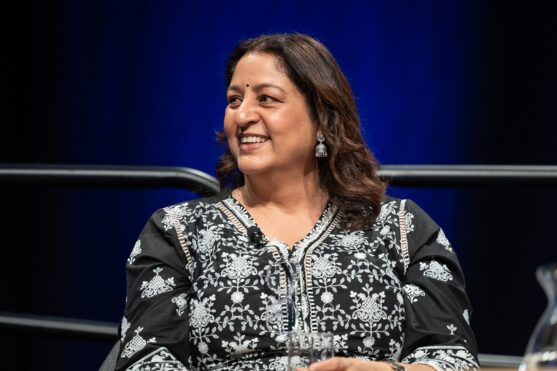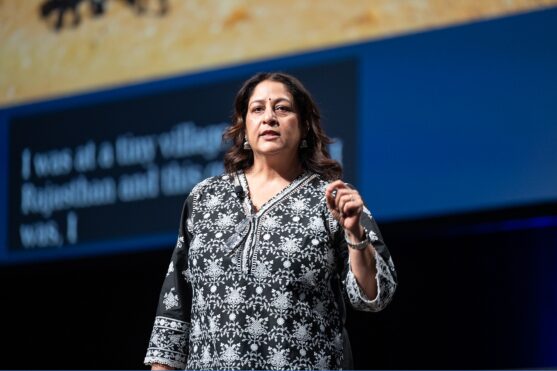Conference questions answered: Safeena Husain, Founder of Educate Girls

One of the plenary sessions at the Philanthropy Australia conference (5-7 August) that struck a chord with many was Safeena Husain’s presentation on accelerating impact at scale through investing in women and girls in India. She shared the stage with James Chen who spoke on Moonshot Philanthropy. The sessions were so jam-packed with engaging content that there was no time for audience questions – although there were several. Here, Safeena has responded to three posed to her. Next week, James Chen will respond to three that were put to him.
1. How did you go about identifying the statistics that 40% of out-of-school girls were in 5% of villages?
While immersed in the Development Impact Bond (DIB), our data analysis brought a significant insight: 70% of out-of-school girls in Bhilwara in Rajasthan, the DIB’s focus area, were concentrated in only 7% of the villages. This revelation prompted us to investigate similar hotspot patterns across India. We partnered with IDinsight and used Advanced Analytics and Machine Learning to develop a key insight: national extrapolation revealed that 40% of out-of-school girls were concentrated in just 5% of India’s villages. Armed with this knowledge, we strategically expanded our efforts to these specific villages, extending our reach from one state during the DIB phase to four states: Rajasthan, Madhya Pradesh, Uttar Pradesh and Bihar. This expansion was pivotal in mobilising more out-of-school girls and successfully helping them reintegrate into the educational system.
2. Is the only way to change the mindset by knocking on doors one by one? Is there an alternative at the national or state level?

We see two sets of barriers that keep girls away from education: societal and systemic. Societal barriers, such as domestic chores, sibling care, early marriage and motherhood, keep the girls out of school. At the root of it lies a deeply ingrained patriarchal mindset that devalues girls – a mindset that sees a goat as an asset and a girl as a liability. Systemic barriers, on the other hand, include challenges like lack of access to secondary school and the unavailability of alternative pathways to education.
These patriarchal mindsets are a human issue, and we need a ‘human solution’. So, we created a community-driven model through Team Balika – hyperlocal and proximate volunteers who go door to door – which has become a big step in overcoming the mindset challenge because it is a local agent with a local message. We solve ‘with’ the community and not ‘for’ them.
Systemic barriers, however, necessitate state-level interventions. Especially since these can unlock sustainable change at scale. By partnering with the state governments, we can work towards incentives like fee waivers and scholarships to increase girls’ access to education. We need to solve for both societal and systemic barriers to create more equitable opportunities for girls and young women who have been marginalised for generations.
3. You mentioned that attending LSE [London School of Economics and Political Science] changed your life. Apart from the mentor in your life who provided unconditional love, who else helped you with this opportunity, before and during?
Having been out of education for almost three years, LSE was the biggest turning point. It was all thanks to my aunt, who advocated for me to return to school.
When I returned to India a decade later, I realised that there are girls from remote, rural and marginalised communities who are often seen as liabilities, who are excluded systematically from education due to deep-seated patriarchal biases and gender-based discrimination. Conversations with girls and their families resonated with my lived experience and helped me realise the value of having someone in your corner to root for you and champion your education. This led me to start Educate Girls.
Once I founded Educate Girls, I was very fortunate to have amazing funders who not only invested long-term but were patient and supportive while we were figuring out and optimising our model. They not only funded us but also mentored me and opened more doors for me so that we could scale our operations to reach millions of girls today.